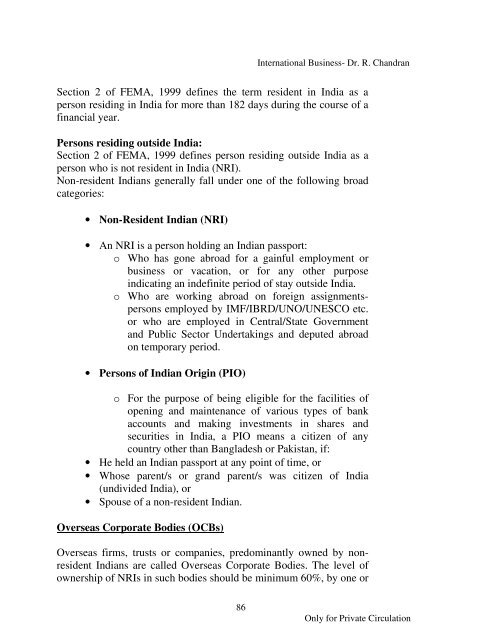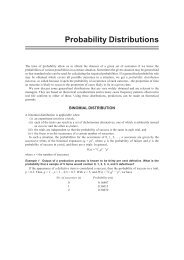- Page 1 and 2:
1 International Business- Dr. R. Ch
- Page 3 and 4:
COMPANY COUNTRY OF ORIGIN REFORM PR
- Page 5 and 6:
5 International Business- Dr. R. Ch
- Page 7 and 8:
7 International Business- Dr. R. Ch
- Page 9 and 10:
4. Diplomatic relations 9 Internati
- Page 11 and 12:
11 International Business- Dr. R. C
- Page 13 and 14:
10. Legal aspects 11. Investment an
- Page 15 and 16:
15 International Business- Dr. R. C
- Page 17 and 18:
17 International Business- Dr. R. C
- Page 19 and 20:
LICENSOR LICENSEE PROVIDE THE RIGHT
- Page 21 and 22:
Supply International Business- Dr.
- Page 23 and 24:
23 International Business- Dr. R. C
- Page 25 and 26:
10. MERGERS AND ACQISITIONS 25 Inte
- Page 27 and 28:
12. TURNKEY PROJECTS 27 Internation
- Page 29 and 30:
13. COUNTER TRADE 29 International
- Page 31 and 32:
31 International Business- Dr. R. C
- Page 33 and 34:
33 International Business- Dr. R. C
- Page 35 and 36: a) Home country Economy 35 Internat
- Page 37 and 38: 37 International Business- Dr. R. C
- Page 39 and 40: SOCIAL ENVIRONMENT 39 International
- Page 41 and 42: 41 International Business- Dr. R. C
- Page 43 and 44: 43 International Business- Dr. R. C
- Page 45 and 46: 45 International Business- Dr. R. C
- Page 47 and 48: 47 International Business- Dr. R. C
- Page 49 and 50: 49 International Business- Dr. R. C
- Page 51 and 52: 1. POLITICAL RISKS 2. ECONOMIC RISK
- Page 53 and 54: 53 International Business- Dr. R. C
- Page 55 and 56: 55 International Business- Dr. R. C
- Page 57 and 58: 57 International Business- Dr. R. C
- Page 59 and 60: 59 International Business- Dr. R. C
- Page 61 and 62: FDI Policy Initiatives 61 Internati
- Page 63 and 64: 63 International Business- Dr. R. C
- Page 65 and 66: 65 International Business- Dr. R. C
- Page 67 and 68: 67 International Business- Dr. R. C
- Page 69 and 70: 69 International Business- Dr. R. C
- Page 71 and 72: 71 International Business- Dr. R. C
- Page 73 and 74: 73 International Business- Dr. R. C
- Page 75 and 76: 75 International Business- Dr. R. C
- Page 77 and 78: Bahrain international Business Cent
- Page 79 and 80: (ACUs). These are operational units
- Page 81 and 82: 6. Essentials of Trade Finance 81 I
- Page 83 and 84: 83 International Business- Dr. R. C
- Page 85: RATES TT Selling Rate Exchange Marg
- Page 89 and 90: 89 International Business- Dr. R. C
- Page 91 and 92: 91 International Business- Dr. R. C
- Page 93 and 94: 93 International Business- Dr. R. C
- Page 95 and 96: 95 International Business- Dr. R. C
- Page 97 and 98: 97 International Business- Dr. R. C
- Page 99 and 100: 99 International Business- Dr. R. C
- Page 101 and 102: 101 International Business- Dr. R.
- Page 103 and 104: 103 International Business- Dr. R.
- Page 105 and 106: 105 International Business- Dr. R.
- Page 107 and 108: 107 International Business- Dr. R.
- Page 109 and 110: 109 International Business- Dr. R.
- Page 111 and 112: 111 International Business- Dr. R.
- Page 113 and 114: ) Constant motivation of subsidiari
- Page 115 and 116: 115 International Business- Dr. R.
- Page 117 and 118: 117 International Business- Dr. R.
- Page 119 and 120: 2. Organizations with an Internatio
- Page 121 and 122: 3.3 Organization according to Geogr
- Page 123 and 124: 123 International Business- Dr. R.
- Page 125 and 126: 125 International Business- Dr. R.
- Page 127 and 128: 127 International Business- Dr. R.
- Page 129 and 130: 129 International Business- Dr. R.
- Page 131 and 132: 131 International Business- Dr. R.
- Page 133 and 134: 133 International Business- Dr. R.
- Page 135 and 136: Joint Venture with an Indian Partne
- Page 137 and 138:
137 International Business- Dr. R.
- Page 139 and 140:
139 International Business- Dr. R.
- Page 141 and 142:
141 International Business- Dr. R.
- Page 143 and 144:
143 International Business- Dr. R.
- Page 145 and 146:
145 International Business- Dr. R.
- Page 147 and 148:
147 International Business- Dr. R.
- Page 149 and 150:
149 International Business- Dr. R.
- Page 151 and 152:
Stage:6 “Global mindset, customer
- Page 153 and 154:
153 International Business- Dr. R.
- Page 155 and 156:
The Decision Making Process 155 Int
- Page 157 and 158:
157 International Business- Dr. R.
- Page 159 and 160:
Environmental Issues 159 Internatio
- Page 161 and 162:
AGREEMENTS OBJECTIVE OF AGREEMENT b
- Page 163 and 164:
AGREEMENTS OBJECTIVE OF AGREEMENT 1
- Page 165 and 166:
AGREEMENTS OBJECTIVE OF AGREEMENT 1
- Page 167 and 168:
AGREEMENTS OBJECTIVE OF AGREEMENT 1
- Page 169 and 170:
AGREEMENTS OBJECTIVE OF AGREEMENT 1
- Page 171 and 172:
AGREEMENTS OBJECTIVE OF AGREEMENT 1
- Page 173 and 174:
AGREEMENTS OBJECTIVE OF AGREEMENT 2
- Page 175 and 176:
AGREEMENTS OBJECTIVE OF AGREEMENT 8
- Page 177 and 178:
AGREEMENTS OBJECTIVE OF AGREEMENT f
- Page 179 and 180:
179 International Business- Dr. R.
- Page 181 and 182:
181 International Business- Dr. R.
- Page 183 and 184:
183 International Business- Dr. R.
- Page 185 and 186:
185 International Business- Dr. R.
- Page 187 and 188:
187 International Business- Dr. R.
- Page 189 and 190:
189 International Business- Dr. R.
- Page 191 and 192:
Tariff Barriers 191 International B
- Page 193 and 194:
D) On the basis of trade relations
- Page 195 and 196:
Types of non-tariff barriers 195 In
- Page 197 and 198:
197 International Business- Dr. R.
- Page 199 and 200:
World Bank 199 International Busine
- Page 201 and 202:
• Macroeconomic & Economic Growth
- Page 203 and 204:
• Local Currency Financing • Mu
- Page 205 and 206:
INTERNATIONAL MONETARY FUND 205 Int
- Page 207 and 208:
ASIAN DEVELOPMENT BANK 207 Internat
- Page 209 and 210:
209 International Business- Dr. R.
- Page 211 and 212:
211 International Business- Dr. R.
- Page 213 and 214:
Mode of transport Type of delivery
- Page 215 and 216:
How many intermediaries are require
- Page 217 and 218:
217 International Business- Dr. R.
- Page 219 and 220:
219 International Business- Dr. R.
- Page 221 and 222:
20’ dry high cube 20’ refrigera
- Page 223 and 224:
223 International Business- Dr. R.
- Page 225 and 226:
225 International Business- Dr. R.
- Page 227 and 228:
227 International Business- Dr. R.
- Page 229 and 230:
229 International Business- Dr. R.
- Page 231 and 232:
231 International Business- Dr. R.
- Page 233 and 234:
233 International Business- Dr. R.
- Page 235 and 236:
235 International Business- Dr. R.
- Page 237 and 238:
237 International Business- Dr. R.
- Page 239 and 240:
239 International Business- Dr. R.
- Page 241 and 242:
Factor Conditions PURCHASING POWER
- Page 243 and 244:
R= 44 ×100 = Rs. 40 110 243 Intern
- Page 245 and 246:
245 International Business- Dr. R.
- Page 247 and 248:
247 International Business- Dr. R.
- Page 249 and 250:
249 International Business- Dr. R.
- Page 251 and 252:
251 International Business- Dr. R.
- Page 253 and 254:
253 International Business- Dr. R.
- Page 255 and 256:
3. Freedom loving and self-reliant.
- Page 257 and 258:
Japan 257 International Business- D
- Page 259 and 260:
259 International Business- Dr. R.
- Page 261 and 262:
261 International Business- Dr. R.
- Page 263 and 264:
263 International Business- Dr. R.
- Page 265 and 266:
Three sources of employees for inte
- Page 267 and 268:
Strategy of the organization Need f
- Page 269 and 270:
269 International Business- Dr. R.





